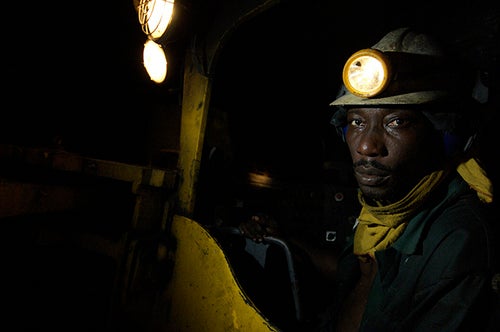
Mining can be a powerful engine for socio-economic growth. It provides critical revenue for building infrastructure in various sectors critical for prosperity and human development. In Africa, in particular, the mining sector has great potential to lift the continent’s poor out of poverty and distribute wealth from elites to citizens and from the central government to communities affected by mining operations. One area where mining revenues can have particularly transformative developmental impacts is in health.
Despite tremendous gains in health care delivery, many African nations still struggle with managing TB infections and reducing mortality rates linked to malaria. While not immediately obvious, mining operations are inextricably linked with health: not only can mining operations create health risks for mine workers, they can also generate social phenomena such as overcrowded settlements (shanty towns), risky behaviors (drugs and alcohol abuse, sexual violence, multiple sexual partners) and migration across borders, which can all contribute to the rapid spread of diseases.
Last month, the World Bank Group hosted a panel of industry and government leaders at the annual Mining Indaba conference in Cape Town, South Africa, to discuss the role of the mining industry in addressing the spread of diseases—both within their workforce and within the communities where they operate.
Five key messages emerged:
1. Enforcement of Occupational Health and Safety Standards Remains a Challenge
Mining companies have a clear role in minimizing the spread of diseases within their workforce, by adhering to occupational health and safety standards, improving living conditions, providing adequate health services, and investing in preventative measures.
The responsibilities of mining companies in this regard are often enshrined in laws. However, a critical challenge remains in monitoring compliance with national regulations and enforcing compliance. In South Africa, despite a strong regulatory regime and broad consensus to promote better health and safety practices in the mining industry, occupational lung diseases—like silicosis—persist. Hon. Dr. Aaron Motsoaledi, South Africa’s Minister of Health, stated that 33% of the country’s TB deaths are attributable to the mining sector, while the incidence of infection within the mining sector is 2,500 to 3,000 per 100,000 population. In comparison, the WHO threshold for a medical emergency is 250 per 100,000.
It is important for mining companies to ‘avoid short cuts’ and instead adhere to international best practices in occupational health and safety, perhaps most importantly in Africa, where many countries lack the capacity to effectively monitor compliance.
2. Protecting the Health of Local Communities is a Shared Responsibility
Mining companies have a clear responsibility toward preventing the spread of diseases within their workforce, but defining a similar role vis-à-vis local communities is less straightforward. From a corporate standpoint, investing in communities is critical for sustaining a long-term partnership with the host government and the local community, as well as in maintaining a social license to operate. For this reason, mining companies work with local health authorities to design and deliver preventative and treatment programs for diseases such as malaria, HIV/AIDS, and TB.
These efforts, however, are usually part of a broader corporate social responsibility program and are not typically integrated into broader health systems strengthening efforts at the national and local levels. It is critical for mining companies and health authorities to jointly define priorities, align interventions, and capitalize on respective comparative advantages.
Since companies pay taxes to governments, should we not expect that these resources will also support community development efforts including critical investments in health? Public health cannot be viewed as the responsibility of the mining companies; rather, it is perhaps more important to discuss—at the national level—how taxes are utilized to support community development as well as what incentives are necessary to encourage mining companies to look ‘beyond their immediate business imperatives’.
3. Crises Like Ebola Can Provide Opportunities for Collaboration
The Ebola crisis has made clear the business case for investing in health beyond mining compounds. The outbreak has disproportionately affected Guinea, Liberia and Sierra Leone, all mineral-rich, post-conflict countries with weak health systems. Mining companies have played a critical role in mitigating the spread of disease through strong community-level information campaigns, proactive testing and screening of mineworkers, stringent movement restrictions, leveraging logistics systems to support relief efforts, and providing donations to support humanitarian efforts. As a result, companies like Sierra Rutile and Rio Tinto, both of which have been at the forefront of mining-led Ebola response, have reported—thus far—no infections on site.
What has become apparent through the crisis, however, is the immense opportunity for collaboration between the health and mining sectors, in contexts where there are shared interests. In the case of Ebola, the crisis—and the fear of the collapse of mining operations—provided common ground for collaboration.
4. Partnerships and Stakeholder Commitment Are Necessary to Sustain Progress
Collaborative health initiatives like the Stop TB Partnership have demonstrated success in sustaining partnerships among mining companies, governments and civil society. A similar, issue-focused partnership, with clearly defined goals, could help accelerate advancements in ensuring compliance in mining operations to health and safety standards, and could help create an enabling environment for the achievement of 90-90-90 treatment targets for TB.
According to Minister Mostoaledi, this 90-90-90 target, modeled after the 90-90-90 treatment target for HIV/AIDS, would seek to ensure that 90% of mine workers and ex-mineworkers know their TB status; that 90% of those testing positive receive treatment; and that 90% of those who receive treatment are free of TB.
Though there is great potential for stronger partnerships among the mining industry, government, trade unions and communities, lack of political commitment remains a challenge, as does the long latency period of diseases like TB, which leads to a diminished sense of urgency. For this reason, partners need to work together to keep these issues at the forefront of socio-political debate.
5. Health Systems Strengthening is Core to Transformative Results
Minister Mostoaledi called on mining companies to join forces with ministries of health to tackle the fundamental challenge of health systems strengthening in Africa. Until health systems can withstand epidemics such as Ebola and can effectively prevent, treat and control the spread of diseases, he noted, mining operations will always be at risk.
It is not enough for companies to protect their workers. The way TB spreads, for instance, demonstrates that there is considerable connectivity between mineworkers, the communities where the live and operate, and the communities where they originate. A more systematic approach to addressing the spread of diseases is needed. To strengthen the health system in Africa, Dr. Mostoaledi proposed the establishment of a regional Center for Disease Control to be co-funded by mining companies as beneficiaries.
In sum, despite the competing interests of government and mining companies, there is great value in a collaborative approach toward addressing the spread of disease. Partnerships in various forms could help leverage mining industry technical and financial resources and infrastructure and ultimately yield healthier and more productive workers.
The key is to act in accordance with international best practice; improve mine health and safety of employees; support to communities affected by mining; strengthen community health systems to promote disease prevention and management; and enhance coordination between government and industry to ensure that countries achieve long-term development goals.
Follow the World Bank health team on Twitter: @WBG_Health


Join the Conversation